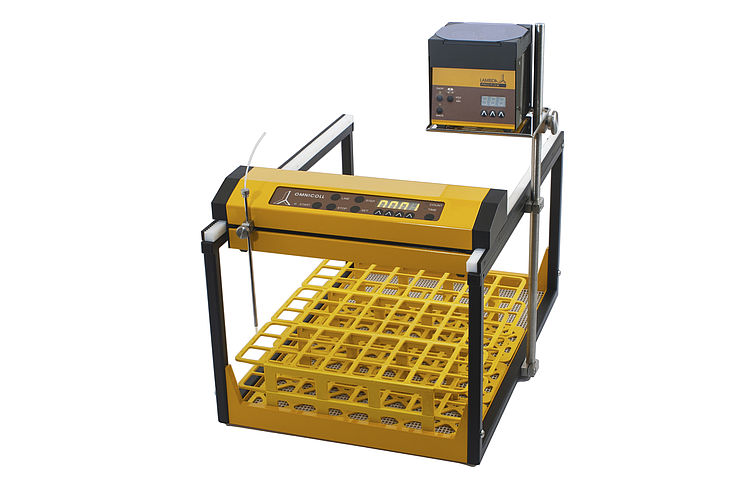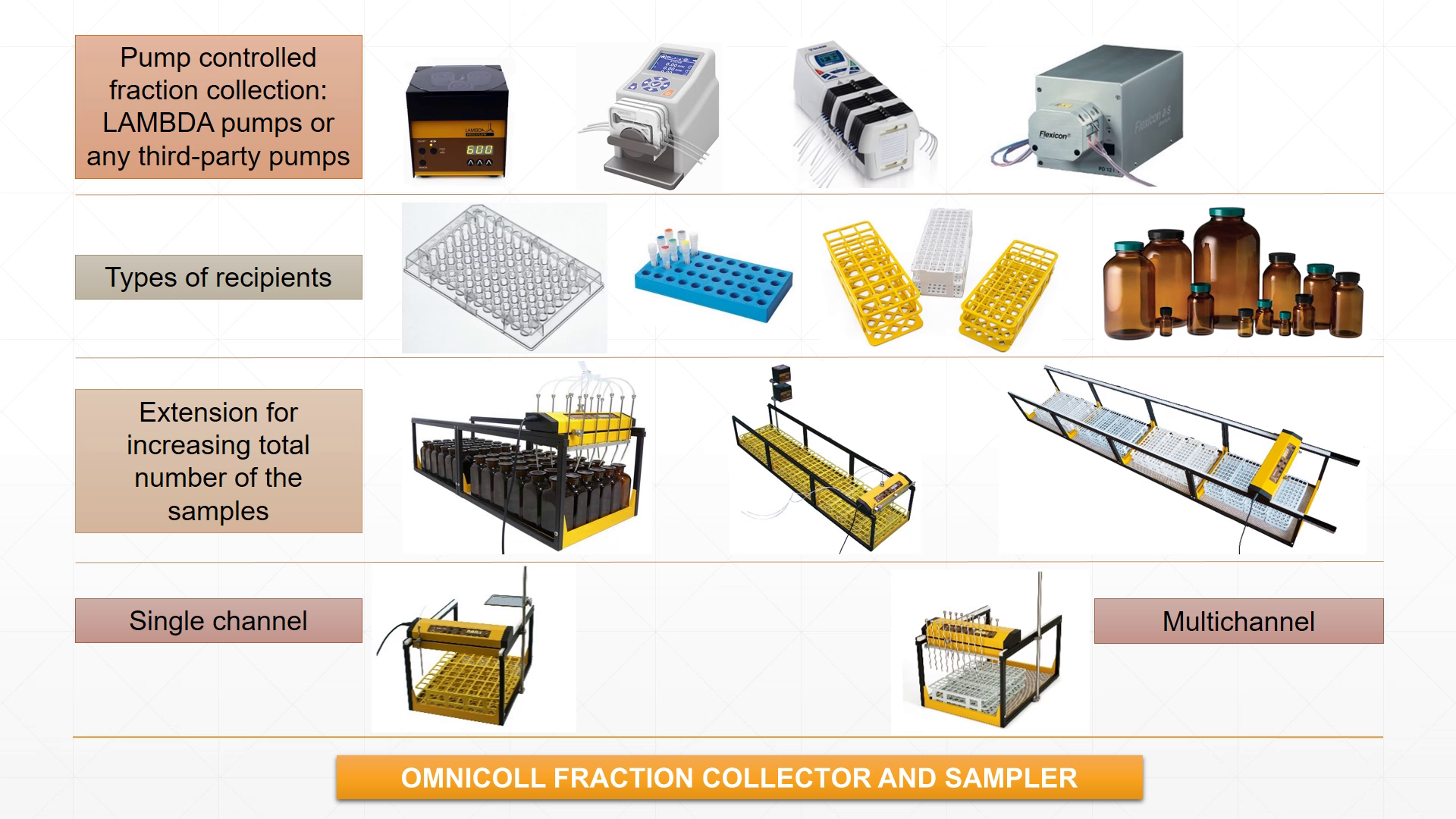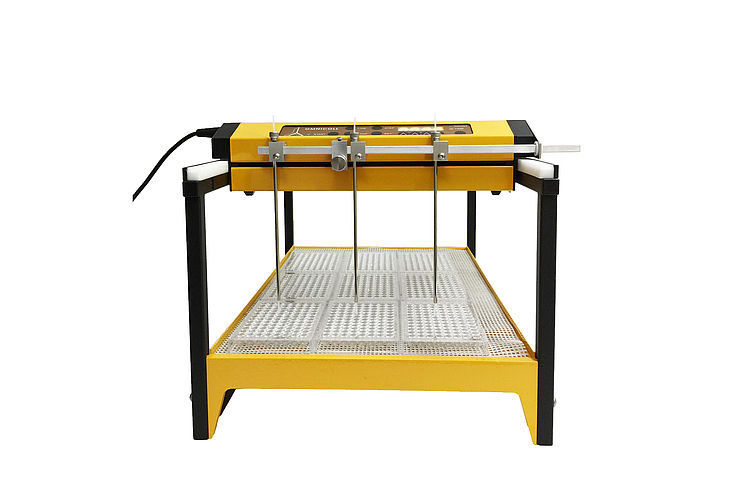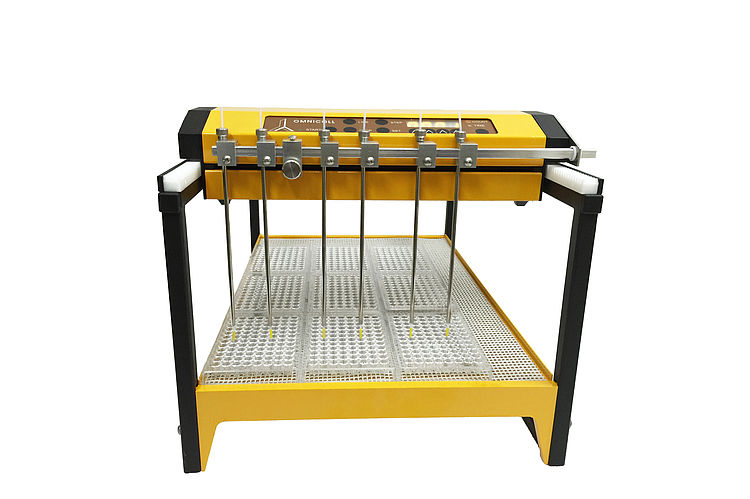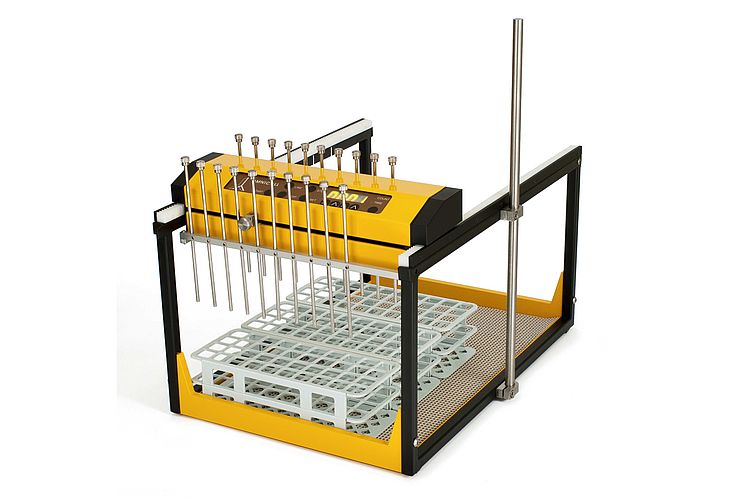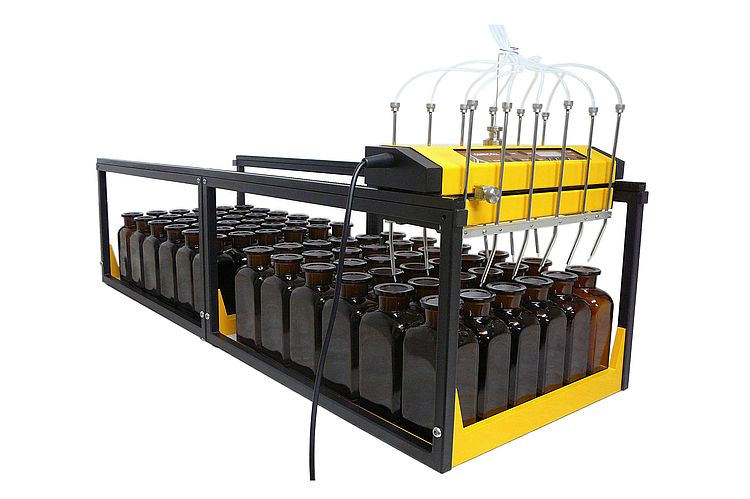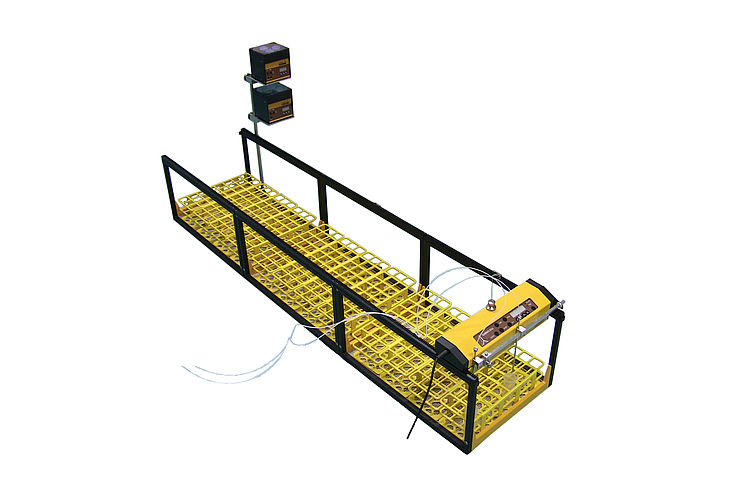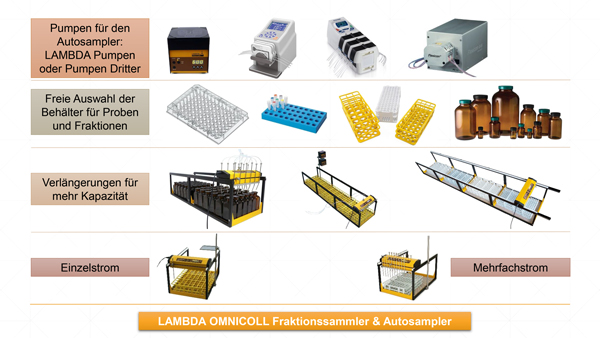Fraction Collector
Fraction Collector
Almost unlimited flexibility – opens new possibilities in chromatography and multiple stream sampling.
LAMBDA OMNICOLL Fraction Collector and Sampler
- Collects fractions in any racks or recipients of your choice
- Collects unlimited number of fractions
- The electronics and moving parts are placed above the tubes
– No damage due to spilling
– Can be placed in a cold bath or any other thermo-stabilized container - Fractionation according to time (0.1–999.9 min and 1–9999 min) or volume (0.05–500 ml or 0.1 to 30 l)
- Solvent resistant construction
- Pause (from 0 to 999.9 min and 1 to 9999 min) or rinsing can be programmed between fractions
- Up to 20 fractions simultaneously; multi-channel operation (optional)
Types of recipients:
OMNICOLL fraction collector can handle nearly all kinds of sampling tubes and laboratory sampling racks or recipients (drops to liters) available on the market.
- Micro titre plates, vials, titer tubes, test tubes, Nalgene lab bottles, larger volume bottles, beakers, flasks, etc. can be used with the fraction collector.
- No special sampling tubes or test tube racks are needed to collect the fractions.
Single stream or multi-stream collection:
Single stream OMNICOLL Fraction collector and Autosampler:
MultiStream OMNICOLL Fraction collector up to 64 channels:
The multi-stream fraction collection assembly for LAMBDA OMNICOLL fraction collectors & autosamplers is available from 2 up to 64 simultaneous streams, based on the liquid chromatography or automated liquid dispensing requirements.
The amount of channels for simultaneous collected streams can be costumized,
| OMNICOLL single channel collector | OMNICOLL 4-stream fraction collection | OMNICOLL 6-channel fraction collector | ||
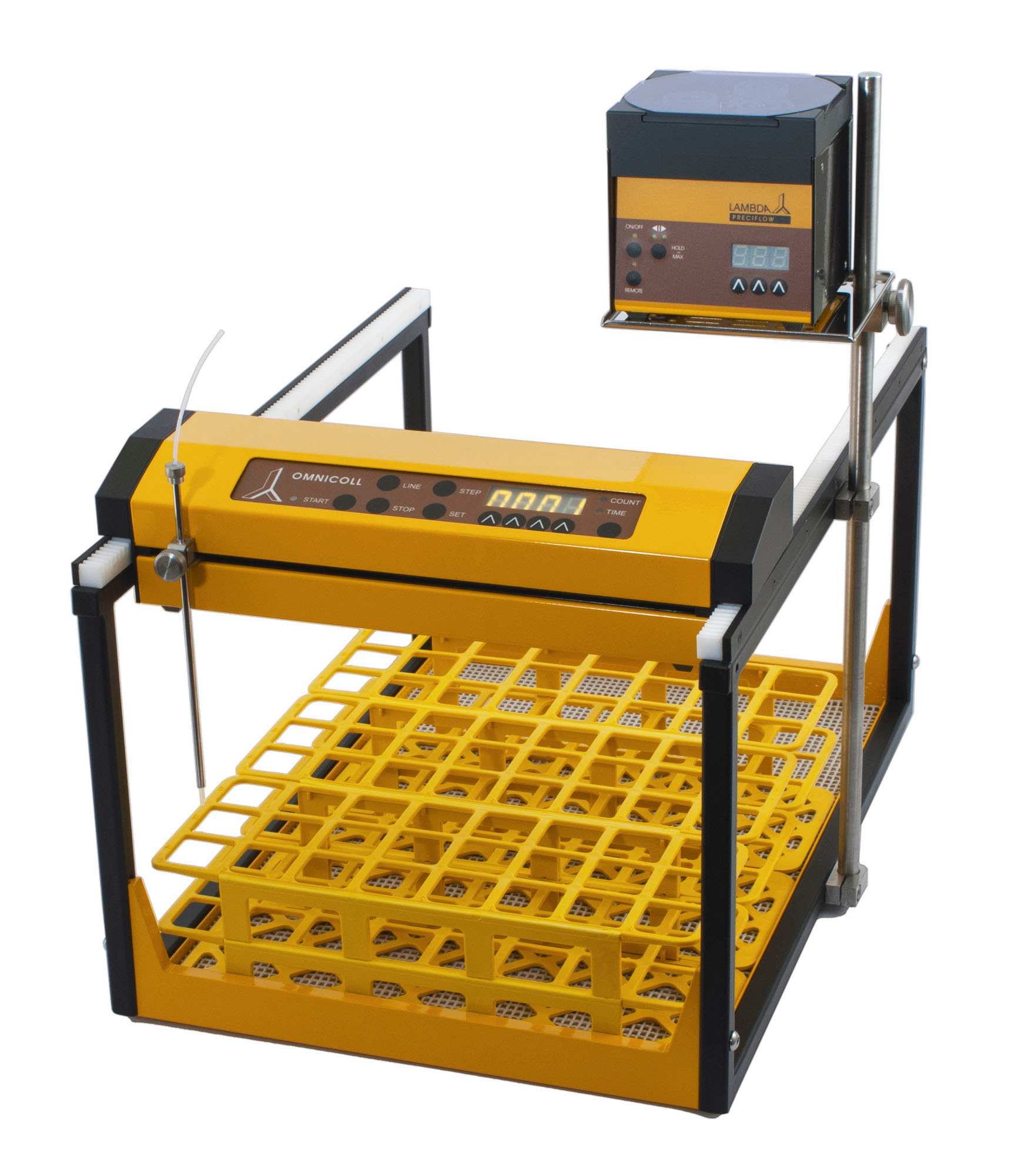 |
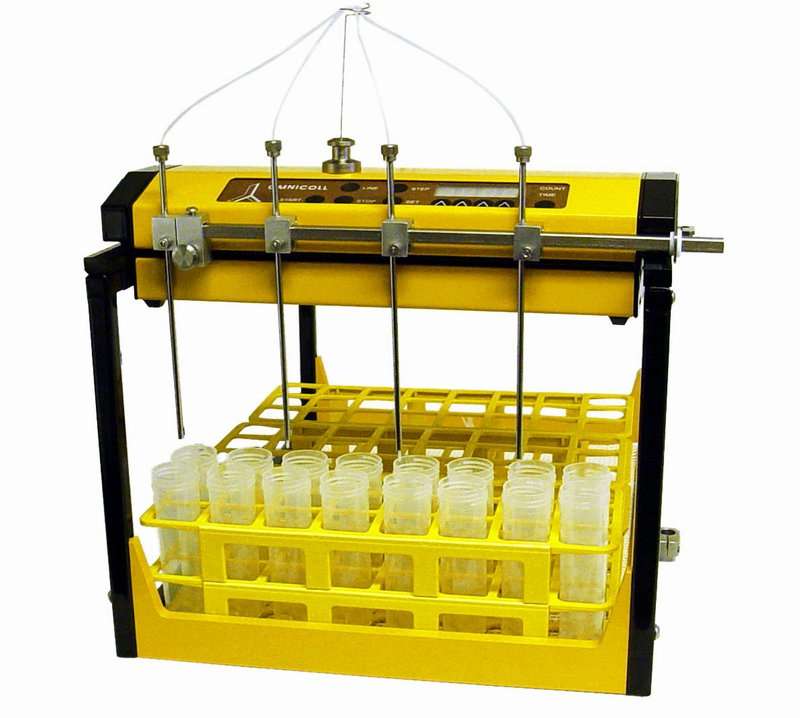 |
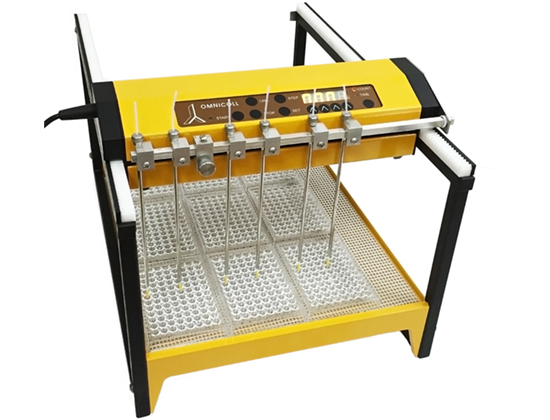 |
Example configurations of single channel and multichannel fraction collector could be viewed at www.fractioncollector.info/multi-stream-fraction-collection/
| Multichannel configuration with adjustable tube guides | Example of customized multi-stream fraction collector LAMBDA OMNICOLL |
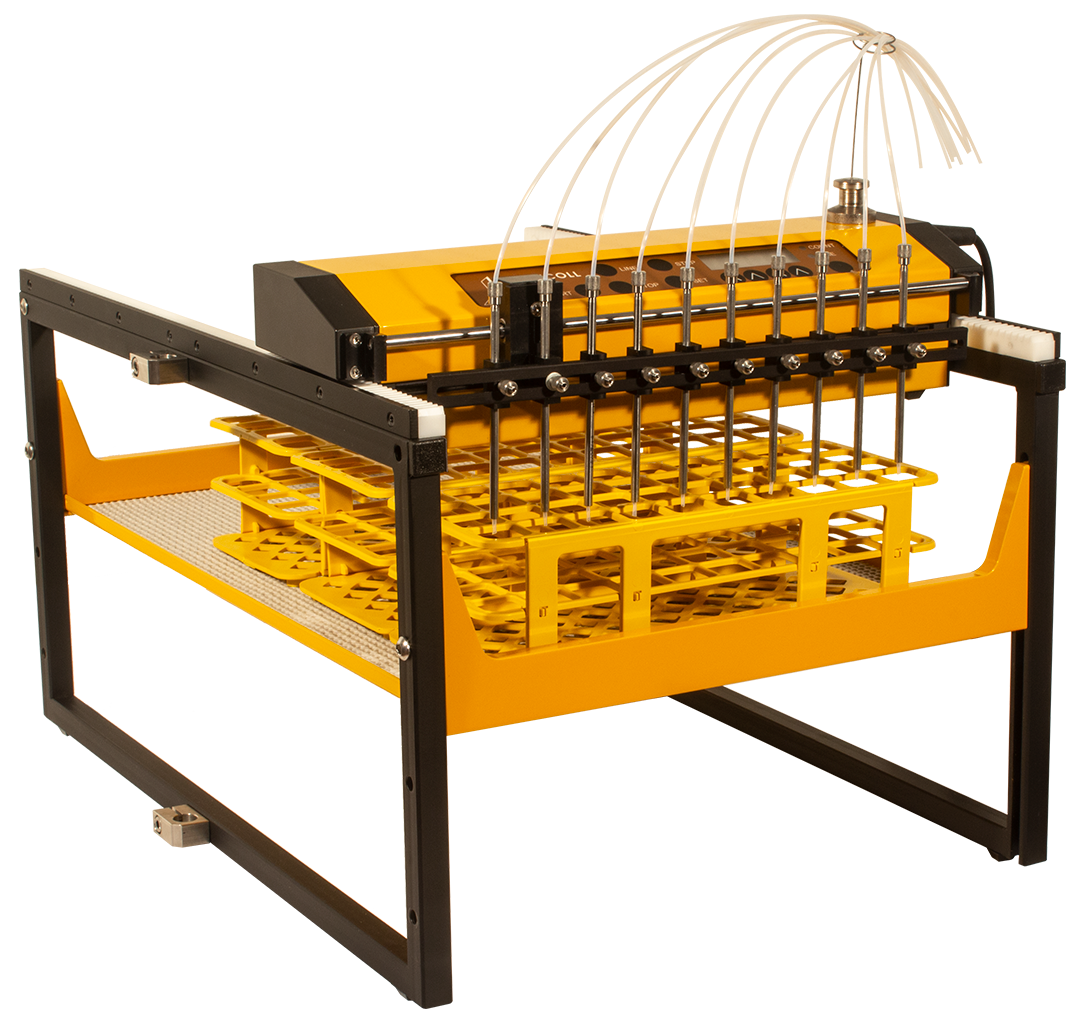 |
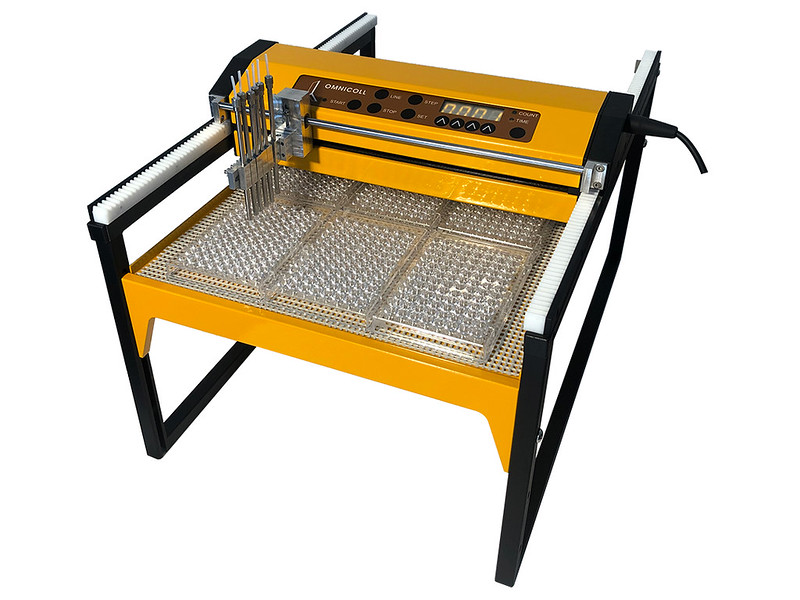 |
Highly flexible control:
- Fraction collection or liquid sampling based on volume / time / drop count / controlled by an external signal.
- Easy to program and handle.
- Unlimited number of fraction collection
Easy extension of tube capacity by additional supports:
The tube capacity of the LAMBDA OMNICOLL fraction collector and sampler can easily be increased by adding rack supports. Virtually any number of such capacity extensions can be added.
| Extended capacity of 12-channel collector with 250 ml bottles: 2 times (= 72 fractions) | Extended 30 mm tube rack capacity of single channel fraction collector: 3 times (= 288 fractions) |
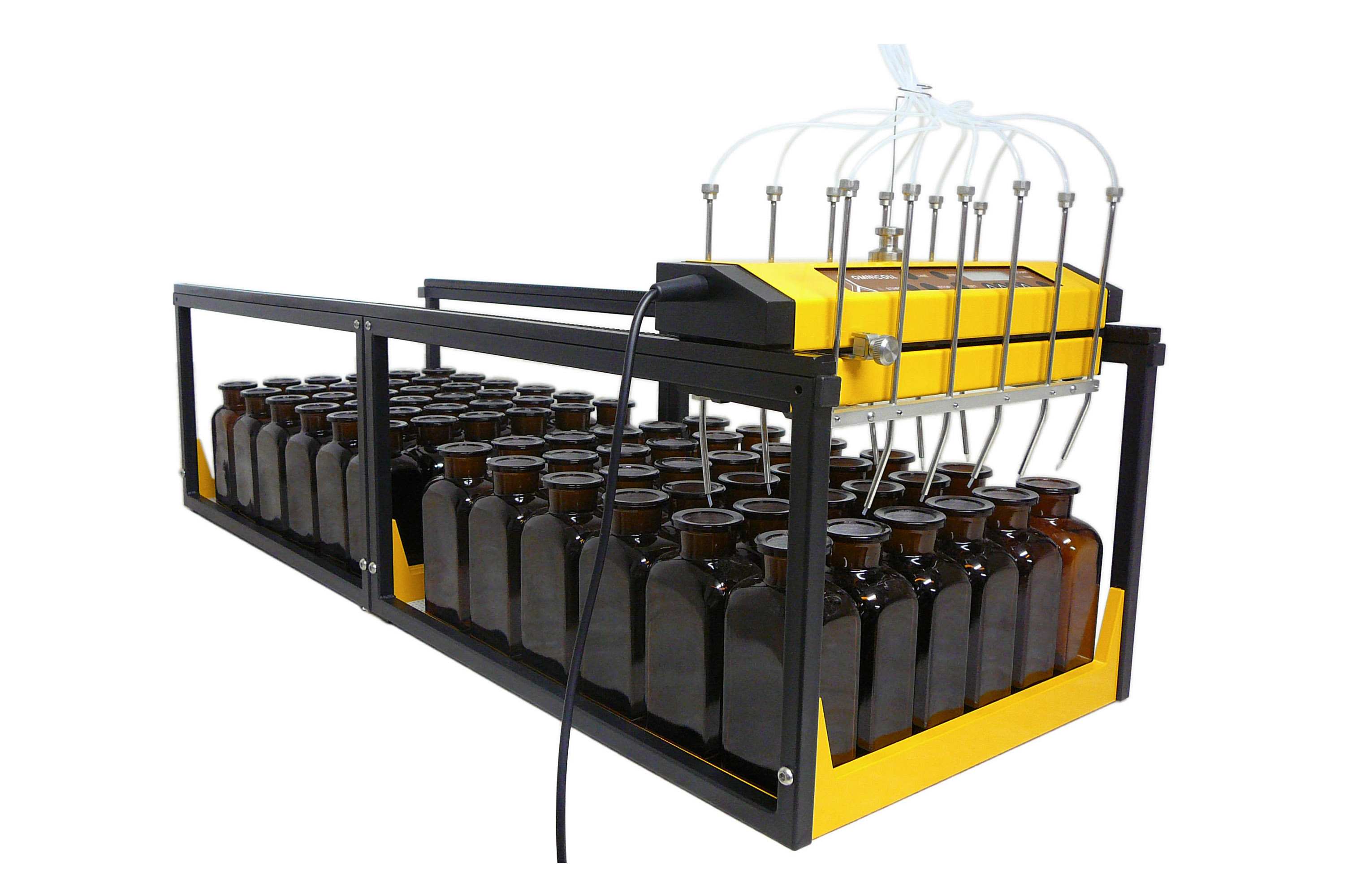 |
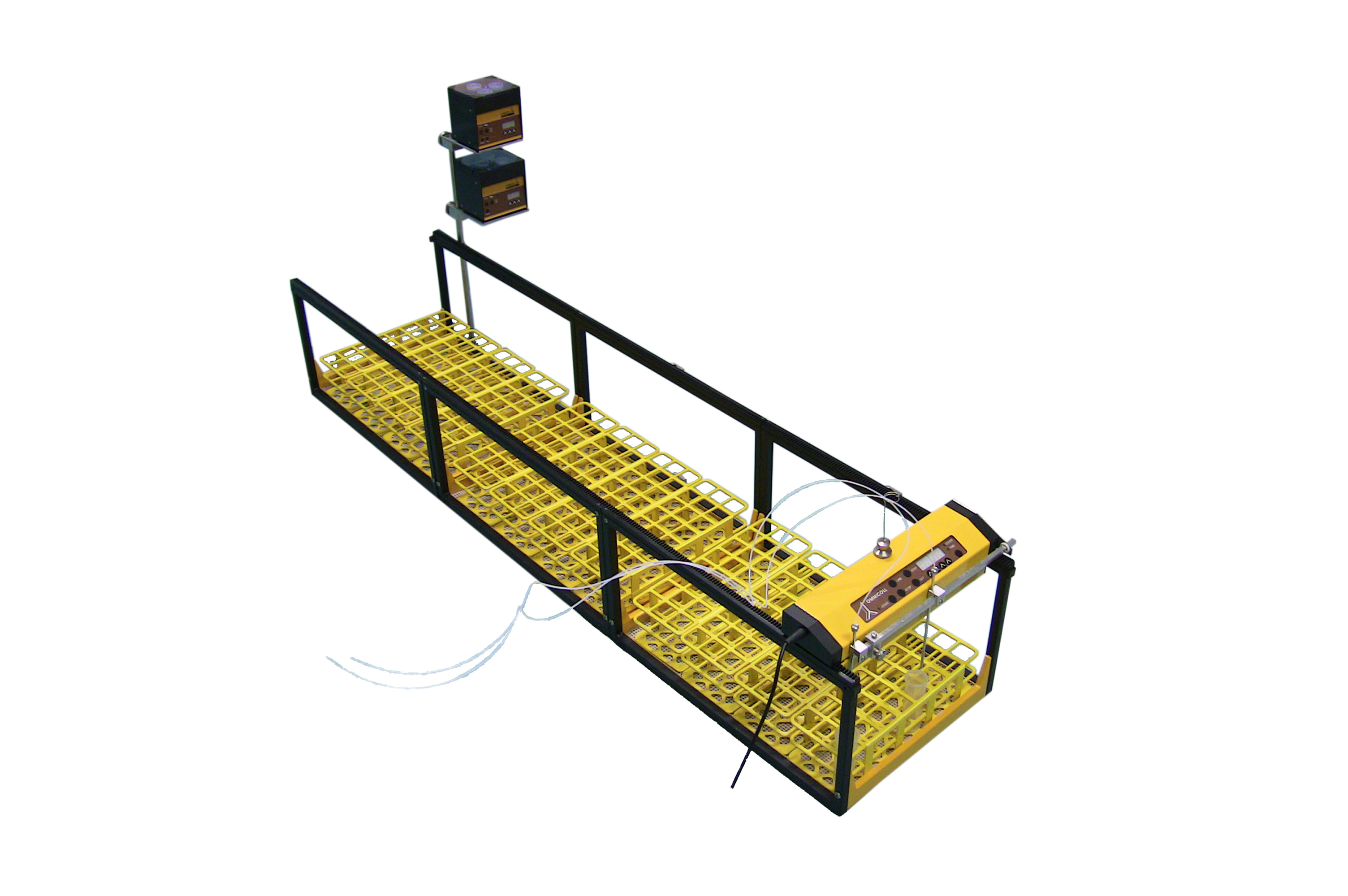 |
Features of the OMNICOLL fraction collector
- The only fraction collector which can be easily programmed for any rack or recipients of your choice
- All electronic and mechanical components have been miniaturised and placed in one moving part, which is placed above the fractions. Therefore, there is no danger of spilling.
- The lower part of the fraction collector can be placed into a cold bath, ice bath or any other thermo-stabilized container.
- Modern microprocessor controlled system using several optical sensors allows for easy programming of the tube positions.
- Fraction collection according to time or volume
- Fraction collection in lines or meander like (zigzag)
- A pause (from 0.1 to 999.9 min and 1 to 9999 min) can be programmed between fractions. Thus, the OMNICOLL fraction collector can be used for taking (single or multiple) samples, e.g. during fermentation processes, cell cultures and other biological or chemical processes.
- The pause function can be used also for an automatic start-up of the fraction collection.
- Washing of the tubing (line washing) between samples is possible, since the number of fractions in a series can be chosen.
- Auto-stop function switches off the fraction collector and the fractionation after a selected rack or at the end of the range
- Pump flow stop function avoids spilling between two consecutive fractions.
- Only the liquid transferring tubing is moved instead of the tubes, this requires much less energy and allows the fraction collector to be miniaturized. Additionally, the tubes are easily accessible from all sides.
- The lower part of the fraction collector can be used for carrying or storage of fractions. A new plastic fixing mat keeps the racks or recipients in position.
- Several lower parts can be combined to increase the fraction collecting capacity of the fraction collector.
- Highest user safety has been attained by supplying the OMNICOLL fraction collector with a low voltage plug-in power supply. This allows also an easy field application of the fraction collector (battery operation possible).
- Solid metal construction makes the OMNICOLL fraction collector insensitive to solvents.
- Can be easily disassembled and requires only little storage space
- Low-maintenance construction
- Competitive price
- Remote control allows sampling after reception of an external signal (such as an alarm). In this way, it is possible to obtain important samples during long processes running even during the absence of a supervisor.
- Drop counter, inert valve, RS-232 interface, TTL signal based collection and other accessories are available as an option
Collection mode: Linear (line), meander (zigzag) or row collection
Normal modus:
Time: 0.1 to 999.9 minutes (16.67 hours) in 0.1 min steps or 1 to 9999 minutes (166.7 hours) in 1 min steps
Volume: 0.01 to 500 ml or 0.6 to 30 litres (external counts using LAMBDA peristaltic pump)
High modus: Same as Normal modus, but with a pause between fractions (from 0.1 to 999.9 minutes or 1 to 9999 minutes)
Remote control:
Normal modus: Collector takes a single fraction after an external voltage pulse of 3-12 V (or 12-30 V with a 3300 ohm resistor)
High modus: Collector takes a 1 to 999 fractions after a single external voltage pulse of 3-12 V (or 12-30 V with a 3300 ohm resistor)
Capacity: Any tube rack or container type with a surface smaller than 45 x 31cm
Standard racks supplied: 360 tubes of 12-13 mm diameter; 240 tubes of 16 mm diameter; 160 tubes of 20 mm diameter; 96 tubes of 30 mm diameter; The capacity can be increased many times by coupling several lower fraction collector parts together.
Non-volatile memory: Storage of all settings
Interface: RS-232 (optional)
Power supply: 95–240 V/60–50 Hz AC plug-in power supply with DC 9V/12W output; possible field operation on 12 V accumulator
Dimensions: 34 (W) x 30 (H) x 49 (D) cm
Weight: 6.5 Kg
Safety: CE, meets IEC 1010/1 norm for laboratory instruments
Operation temperature : 0-40 °C
Operation humidity: 0-90% RH, not condensing
Remote control: 0-10 V; (option 0-20 or 4-20 mA)
- EN - OMNICOLL fraction collector and sampler - Leaflet (pdf)
- EN - Operation manual - OMNICOLL fraction collector and sampler (pdf)
- DE - Broschüre OMNICOLL Fraktionssammler und Probenehmer - Prospekt (pdf)
- DE - Bedienungsanleitung OMNICOLL Fraktionssammler und Probenehmer (pdf)
- FR - OMNICOLL collecteur de fractions et d'échantillons - brochure (pdf)
- FR - Manuel d’utilisation - Collecteur de fractions et échantillonneur OMNICOLL (pdf)
- CZ - OMNICOLL sběrač frakcí - leták (pdf)
- CZ - Návod - OMNICOLL sběrač frakcí (pdf)
- RU - Коллектор фракций и автосамплер LAMBDA OMNICOLL - листовка (pdf)
- RU - Коллектор фракций и автосамплер LAMBDA OMNICOLL - руководство по эксплуатации (pdf)
- ES - Manual de instrucciones - Colector de fracciones y muestras LAMBDA OMNICOLL (pdf)
- ES - OMNICOLL - colector de fracciones y muestreador - folleto (pdf)
- IT - Manuale operativo - LAMBDA OMNICOLL raccoglitore di frazioni-campionatore (pdf)
2024
Ion exchange column chromatography: LAMBDA OMNICOLL was used for collecting 40 ml fractions.
Riemersma, M.C. (2024). Separation of terbium from gadolinium by solvent extraction, Upscaling terbium production for use in radionuclide therapy. TU Delft, Applied Sciences, Master thesis.
https://resolver.tudelft.nl/uuid:d2dcd756-a4d2-4d3a-8709-7c537f41796b (2024 Nov. 08)
Dynamic membrane adsorption (flow-through mode, filtration area 3.8 cm2): Dynamic breakthrough experiments to investigate the influence of flux, NaCl and pH were run in duplicates and the permeate was collected by an automated LAMBDA OMNICOLL fraction sampler.
Wullenweber, J., Bennert, J., Mantel, T., & Ernst, M. (2024). Characterizing Macroporous Ion Exchange Membrane Adsorbers for Natural Organic Matter (NOM) Removal—Adsorption and Regeneration Behavior. Membranes, 14(6), 124.
https://doi.org/10.3390/membranes14060124
LAMBDA OMNICOLL facilitates the recuperation of desorbed fractions in a fixed-bed adsorption–desorption setup (industrial prototype with two packed chromatograhy columns (stainless-steel, 50 mm × 20 mm, bed volume 15.71 ml))
Bzainia, A., Igrejas, G., Pereira, M. J. V., Costa, M. R. P., & Dias, R. C. (2024). Purification of stilbenes from grape stems in a continuous process based on photo-molecularly imprinted adsorbents and hydroalcoholic solvents. Separation and Purification Technology, 127798.
https://doi.org/10.1016/j.seppur.2024.127798
2023
The sorption installation consisted of a peristaltic pump Ismatec IPC8 (flow rate 7.5 ml/h), a glass sorption column (diameter 15 mm; 5 ml ion-exchange resin ) and an automatic fraction collector LAMBDA OMNICOLL.
Skripchenko, S. Y., Nalivaiko, K. A., Titova, S. M., Rychkov, V. N., & Semenishchev, V. S. (2023). Recovery of uranium from conversion production sludge by leaching with nitric acid and subsequent ion-exchange concentration. Hydrometallurgy, 106255.
https://doi.org/10.1016/j.hydromet.2023.106255
At each 10-minute time interval, the effluent from the column was collected into 5 mL vials using a LAMBDA OMNICOLL fraction collector.
Choudhary, A., Khandelwal, N., Ganie, Z. A., & Darbha, G. K. (2023). Influence of magnetite and its weathering originated maghemite and hematite minerals on sedimentation and transport of nanoplastics in the aqueous and subsurface environments. Science of The Total Environment, 169132.
https://doi.org/10.1016/j.scitotenv.2023.169132
LAMBDA OMNICOLL used for column chromatography in Environmental Nanoscience Laboratory, Darbha's research group:
https://gkdarbha.wixsite.com/gopaladarbha/instrumentation (2024 Jan. 03)
https://static.wixstatic.com/media/11a26b_72ea880a9edb434ca34e530fef35c200~mv2.jpg (2024 Jan. 03)
https://static.wixstatic.com/media/11a26b_60f73569d1e443da848c87333dc7d8ca~mv2.png/v1/fill/w_532,h_552,al_c,lg_1,q_85,enc_auto/fraction%20pump.png (2024 Jan. 03)
LAMBDA OMNICOLL fraction collector equipped with a peristaltic pump: For each soil column (length 22 cm, internal diameter 2.5 cm), 120 fractions were collected with a volume of 3 ml per fraction.
Pena Silva, S. M. (2023). Estudio de los procesos de adsorción/desorción de 2-isopropil-6-metil-4-pirimidinol (IMPH) y 3, 5, 6-tricloro-2-piridinol (TCP) en montmorillonita pilarizada mediante la inclusión de especies de [Fe, Al], Zr y Ti y su potencial uso en la mitigación de lixiviación desde suelos agrícolas.
https://repositorio.uchile.cl/handle/2250/195796 (01. December 2023)
Gel permeation chromatography (GPC) with Superose 6 Increase 10/300 GL column (GE Healthcare) on an HPLC system (Agilent/Varian Prostar 210): Fractions were collected at the injection time point at 0.5 ml per fraction using a LAMBDA OMNICOLL fraction collector onto flat-bottom 96-deep-well plates (Costar 3599, Corning).
Wannitikul, P., Wattana-Amorn, P., Sathitnaitham, S., Sakulkoo, J., Suttangkakul, A., Wonnapinij, P., W. Bassel, G.W., Simister, R., Leonardo D., Gomez, L.D & Vuttipongchaikij, S. (2023). Disruption of a DUF247 Containing Protein Alters Cell Wall Polysaccharides and Reduces Growth in Arabidopsis. Plants, 12(10), 1977.
https://doi.org/10.3390/plants12101977
Simultaneous fraction collection: At five-minute intervals, samples were collected simutaneously from four column outlets using a LAMBDA OMNICOLL automatic fraction collector.
Abdelrady, A., Tang, Y., Bogaard, T. & Foppen, J. W. (2023). The Use of Silica Encapsulated DNA Particles with a Supermagnetic Iron Core (Sidnamag) in Sand Filtration System: Effect of Water Chemistry. Available at SSRN 4555357.
https://dx.doi.org/10.2139/ssrn.4555357
Acid-washed sand (2.65 g/cm3) column (2.7 x 8 cm) upward flow (0.40 mL/min) DNAcol experiments:The effluent was collected continuously with a sampling period of 5 min using a LAMBDA OMNICOLL fraction collector.
Kianfar, B., Hassanizadeh, S. M., Abdelrady, A., Bogaard, T., & Foppen, J. W. (2023). Natural organic matter and ionic strength (CaCl2) affect transport, retention and remobilization of silica encapsulated DNA colloids (DNAcol) in saturated sand columns. Colloids and Surfaces A: Physicochemical and Engineering Aspects, 678, 132476.
https://doi.org/10.1016/j.colsurfa.2023.132476
Electrochemical reactions in flow setups with switching valve and LAMBDA OMNICOLL fraction collector (which can be operated with different sized collection vessels) as peripheral equipment for collecting electrolyte.
Hielscher, M. M., Dörr, M., Schneider, J. & Waldvogel S. R. (2023). LABS: Laboratory Automation and Batch Scheduling – A Modular Open Source Python Program for the Control of Automated Electrochemical Synthesis with a Web Interface. Chem. Asian J. 2023, e202300380.
https://doi.org/10.1002/asia.202300380
Influence of SDS and TX-100 surfactants on the vertical transport of the fungicide metabolite OH-CTL: at the top of the columns (1.8 cm (id) x 20 cm (h) PMMA, packed 18 cm (h) water-saturated soil & top layer of surfactant-modified soil), 4 ml of OH-CTL solution (40 µg/ml hydroxy chlorothalonil in water) were applied at a constant flow rate of 1 ml/min. Then continuously leaching with 1 ml/min water (UPW) until at least 10 or 40 pore volumes were collected. Fractions were taken on a LAMBDA OMNICOLL automated fraction collector.
Báez, M. E., Sarkar, B., Peña, A., Vidal, J., Espinoza, J., & Fuentes, E. (2023). Effect of surfactants on the sorption-desorption, degradation, and transport of chlorothalonil and hydroxy-chlorothalonil in agricultural soils. Environmental Pollution, 327, 121545.
https://doi.org/10.1016/j.envpol.2023.121545
2022
Adsorption tests in sand columns (PMMA, 3.2 cm diameter x 7.0 cm lenght): The effluent was collected with a fraction collector LAMBDA OMNICOLL to determine the Zn and Fe concentrations.
Krok, B., Mohammadian, S., Noll, H. M., Surau, C., Markwort, S., Fritzsche, A., Fritzsche, A., Nachev, M., Sures, B. & Meckenstock, R. U. (2022). Remediation of zinc-contaminated groundwater by iron oxide in situ adsorption barriers–From lab to the field. Science of The Total Environment, 807, 151066.
https://doi.org/10.1016/j.scitotenv.2021.151066
Samples were collected simultaneously using an automatic fraction collector LAMBDA OMNICOLL from the top of two PVC columns (15 cm, ID 2.1 cm; Milder) packed with 355–425 µm diameter grain size quartz sand (Sibelco).
Chakraborty, S., Foppen, J. W., & Schijven, J. F. (2022). Effect of concentration of silica encapsulated ds-DNA colloidal microparticles on their transport through saturated porous media. Colloids and Surfaces A: Physicochemical and Engineering Aspects, Volume 651, 2022, 129625.
https://doi.org/10.1016/j.colsurfa.2022.129625
To compare the effectiveness of the biosurfactant for PAH removal with commercially available surfactants, dynamic experiments in columns were carried out. Fraction collector (Omnicoll®, LAMBDA Laboratory Instruments GmbH, Switzerland) was placed at the column outlet to recover the effluent fractions prior to further analyses.
Cazals, F., Colombano, S., Huguenot, D., Betelu, S., Galopin, N., Perrault, A., Simonnot, M.-O., Ignatiadis, I., Rossano, S. & Crampon, M. (2022). Polycyclic aromatic hydrocarbons remobilization from contaminated porous media by (bio) surfactants washing. Journal of Contaminant Hydrology, 251, 104065.
https://doi.org/10.1016/j.jconhyd.2022.104065
The flow velocity was maintained using a peristaltic pump. Treated effluents were collected at set time intervals using a program-mable fraction collector (LAMBDA OMNICOLL single channel collector).
Feizi, F., Sarmah, A. K., Rangsivek, R. & Gobindlal, K. (2022). Adsorptive removal of propranolol under fixed-bed column using magnetic tyre char: Effects of wastewater effluent organic matter and ball milling. Environmental Pollution, Volume 305, 2022, 119283, ISSN 0269-7491.
https://doi.org/10.1016/j.envpol.2022.119283
Effluents were collected in 2 h increments (corresponding to 7.5 PV, ca.5.4 mL) using a fraction collector (LAMBDA OMNICOLL), sealed in PP bottles and refrigerated until analysis.
Perdrial, N., Vázquez-Ortega, A., Reinoso-Maset, E., O'Day, P. A. & Chorover, J. (2022). Effects of flow on uranium speciation in soils impacted by acidic waste fluids. Journal of Environmental Radioactivity, Volumes 251–252, 2022, 106955, ISSN 0265-931X.
https://doi.org/10.1016/j.jenvrad.2022.106955
Dynamic sorption experiments were conducted in a fixed-bed column with 5 mL of RUA21207 resin. The solution was passed through a column at a 10 mL h− 1 flow rate. Samples of the solution were taken at regular intervals (1 h) using the fraction collector and autosampler LAMBDA OMNICOLL.
Smyshlyaev, D., Kirillov, E., Kirillov, S., Bunkov, G., Rychkov, V., Botalov, M., Taukin, A., Yuldashbaeva, A. & Malyshev, A. (2022). Recovery and separation of Sc, Zr and Ti from acidic sulfate solutions for high purity scandium oxide production: Laboratory and pilot study. Hydrometallurgy, Volume 211, 2022, 105889, ISSN 0304-386X.
https://doi.org/10.1016/j.hydromet.2022.105889
In the first part of the experiment, sorption with various resins was studied under statistical conditions. For this purpose, the sorbent was brought into contact with a model leaching solution, mixed for 24 hours, after which a solution sample was taken and analyzed. Sorption was carried out under dynamic conditions by passing the solution through an ion-exchange column using a peristaltic pump; samples were taken by the LAMBDA OMNICOLL fraction collector.
Oqilov, B. R., Botalov, M. S., Rychkov, V. N., & Kirillov, E. V. (2022, June). Study of sorption leaching of scandium from red mud with Succinic acid. In AIP Conference Proceedings (Vol. 2466, No. 1, p. 050025). AIP Publishing LLC.
https://doi.org/10.1063/5.0092655
The effluent was automatically sampled in fractions of 10 mL using a LAMBDA OMNICOLL Fraction Collector (Lambda Laboratory Instruments, Brno, Czech Republic). The desorption of heavy metal ions was also studied in dynamic conditions by passing a 0.1 M HCl aqueous solution through the column at a flow rate of 1 mL/min.
Dinu, M. V., Humelnicu, I., Ghiorghita, C. A., & Humelnicu, D. (2022). Aminopolycarboxylic acids-functionalized chitosan-based composite cryogels as valuable heavy metal ions sorbents: Fixed-bed column studies and theoretical analysis. Gels, 8(4), 221.
https://doi.org/10.3390/gels8040221
Soil column experiments were conducted with adjustable-height chromatography columns, made of borosilicate glass..For each experiment ~0.8 ml column effluent was collected in a 20-ml centrifuge tube using a fraction collector LAMBDA OMNICOLL.
Kianfar, B., Tian, J., Rozemeijer, J., van der Zaan, B., Bogaard, T. A., & Foppen, J. W. (2022). Transport characteristics of DNA-tagged silica colloids as a colloidal tracer in saturated sand columns; role of solution chemistry, flow velocity, and sand grain size. Journal of Contaminant Hydrology, 246, 103954
https://doi.org/10.1016/j.jconhyd.2022.103954
The uranium sorption from model solutions in static mode was carrying out by use of anion-exchangers. The volume of resin loaded in the column was 5 mL, the filtration rate of solution through resin layer was 5 bed volume for 1 h. The filtrate at the outlet of the column was sampled by use of automatic fraction collector LAMBDA OMNICOLL (LAMBDA Laboratory Instruments, Switzerland).
Nalivaiko, K., Skripchenko, S., Titova, S., & Rychkov, V. (2022). Characterization and processing of radioactive uranium containing waste sludge by sulfuric acid leaching. Journal of Environmental Chemical Engineering, 10(1), 106972.
https://doi.org/10.1016/j.jece.2021.106972
During the firn core melting process in a clean booth (ISO 5), the remaining sample stream from the debubbler was collected with a liquid fraction collector LAMBDA OMNICOLL (~0.7 mL/min) as an archive of the meltwater.
Seokhyun Ro, S., Hur, S. D., Hong, S., Chang, Ch., Moon, J., Han, Y., Jun, S. J., Hwang, H. & Hong, S. (2020). An improved ion chromatography system coupled with a melter for highresolution ionic species reconstruction in Antarctic firn cores. Microchemical Journal, Elsevier, MICROC 105377
https://doi.org/10.1016/j.microc.2020.105377
2021
Programmed LAMBDA OMNICOLL single channel collector for collecting 3 mL of aqueous solutions at the outlet of a column at set time intervals.
Feizi, F., Sarmah,A.K. & Rangsivek, R. (2021). Adsorption of pharmaceuticals in a fixed-bed column using tyre-based activated carbon: Experimental investigations and numerical modelling. Journal of Hazardous Materials, 2021.
https://doi.org/10.1016/j.jhazmat.2021.126010
Effluent solutions were collected with the fraction collector LAMBDA OMNICOLL.
Vázquez-Ortega, A., Perdrial, N., Reinoso-Maset, E., Root, R. A., O’Day, P. A. & Chorover, J. (2021). Phosphate controls uranium release from acidic waste-weathered Hanford sediments. Journal of Hazardous Materials, Volume 416, 2021, 126240, ISSN 0304-3894.
https://doi.org/10.1016/j.jhazmat.2021.126240
The elute was collected using LAMBDA OMNICOLL fraction collector in 15 mL vials at a regular time interval and analyzed for concentrations in the effluents.
Khandelwal, N., Tiwari, E., Singh, N., & Darbha, G. K. (2021). Heterogeneously Porous Multiadsorbent Clay–Biochar Surface to Support Redox-Sensitive Nanoparticles: Applications of Novel Clay–Biochar–Nanoscale Zerovalent Iron Nanotrident (C-BC-nZVI) in Continuous Water Filtration. ACS ES&T Water, 1(3), 641-652.
https://doi.org/10.1021/acsestwater.0c00147
2020
Dynamic Sorption Studies: A fraction collector LAMBDA OMNICOLL collected effluent samples every 15 min. Elution of heavy metal ions (HMIs) was performed by passing of 0.1 M HCl through the fixed-bed column with a flow velocity of 0.42 ml/min.
Humelnicu, D., Dragan, E. S., Ignat, M., & Dinu, M. V. (2020). A comparative study on Cu2+, Zn2+, Ni2+, Fe3+, and Cr3+ metal ions removal from industrial wastewaters by chitosan-based composite cryogels. Molecules, 25(11), 2664.
https://doi.org/10.3390/molecules25112664
LAMBDA OMNICOLL connected to a HPLC column - by using a valve and a capillary - for collecting 2 ml fractions in 96 small scintillation vials (capacity of ~6 mL).
Gaugler, P., Gaugler, V., Kamleitner, M., & Schaaf, G. (2020). Extraction and quantification of soluble, radiolabeled inositol polyphosphates from different plant species using SAX-HPLC. JoVE (Journal of Visualized Experiments), (160), e61495.
LAMBDA OMNICOLL Fraction Collector enabled the sampling of defined depth intervals. It is positioned in a glovebox using Argon to prevent re-oxidation of the samples.
Schroeder, H., Duester, L., Fabricius, A. L., Ecker, D., Breitung, V., & Ternes, T. A. (2020). Sediment water (interface) mobility of metal (loid) s and nutrients under undisturbed conditions and during resuspension. Journal of hazardous materials, 394, 122543.
https://doi.org/10.1016/j.jhazmat.2020.122543
2019
Perifusate fractions were collected using a LAMBDA OMNICOLL automated fraction collection system into 96-well MASTERBLOCK plates (Greiner bio-one) and at the end of the experiment stored at −80 °C
Barlow, J., & Solomon, T. P. (2019). Conditioned media from contracting skeletal muscle potentiates insulin secretion and enhances mitochondrial energy metabolism of pancreatic beta-cells. Metabolism, 91, 1-9.
https://doi.org/10.1016/j.metabol.2018.11.004
To study the impact of mechanical disturbance and acidification on the metal(loid), LAMBDA OMNICOLL fraction collector is used to collect 12 profiles of 22 samples during each experiment.
Schroeder, H., Fabricius, A. L., Ecker, D., Ternes, T. A., & Duester, L. (2019). Impact of mechanical disturbance and acidification on the metal (loid) and C, P, S mobility at the sediment water interface examined using a fractionation meso profiling ICP-QQQ-MS approach. Science of the Total Environment, 651, 2130-2138.
https://doi.org/10.1016/j.scitotenv.2018.09.390
2017
LAMBDA OMNICOLL fraction collector and LAMBDA PRECIFLOW peristaltic pump positioned in a glove box under an argon-atmosphere in a novel meso profiling and sampling system (messy) for biogeochemical studies of water pollution.
Schroeder, H., Fabricius, A. L., Ecker, D., Ternes, T. A., & Duester, L. (2017). Metal (loid) speciation and size fractionation in sediment pore water depth profiles examined with a new meso profiling system. Chemosphere, 179, 185-193.
https://doi.org/10.1016/j.chemosphere.2017.03.080
2016
Automated sample collector OMNICOLL was used to collect effluent samples (10 ml/min) from the packed bed column to evaluate the transport potential of stabilized milled ZVI particle suspensions
Velimirovic, M., Schmid, D., Wagner, S., Micić, V., von der Kammer, F., & Hofmann, T. (2016). Agar agar-stabilized milled zerovalent iron particles for in situ groundwater remediation. Science of The Total Environment, 563, 713-723.
https://doi.org/10.1016/j.scitotenv.2015.11.007
Helmholtz-Centre for Environmental Research - UFZ, Germany; University of Vienna, Austria
2015
Effluent samples were collected from the fixed bed column by the multi-channel LAMBDA OMNICOLL fraction collector to study the adsorption of selenite and selenate by Mg-Al-CO3 LDH in the continuous flow system
Chubar, N. & Szlachta, M. (2015). Static and dynamic adsorptive removal of selenite and selenate by alkoxide-free sol–gel-generated Mg–Al–CO3 layered double hydroxide: Effect of competing ions. Chemical Engineering Journal 279 (2015): 885-896.
https://doi.org/10.1016/j.cej.2015.05.070
Utrecht University, The Netherlands; Glasgow Caledonian University, UK and Wrocław University of Technology, Poland.
2014
Effluent from the glass chromatography column was collected by the LAMBDA OMNICOLL fraction collector to study ion-exchange reactions between Na+, H+, and Ca2+ under dynamic conditions.
Lu, J., Tertre, E., & Beaucaire, C. (2014). Assessment of a predictive model to describe the migration of major inorganic cations in a Bt soil horizon. Applied Geochemistry, Volume 41, February 2014, Pages 151-162.
https://doi.org/10.1016/j.apgeochem.2013.12.009
CEA, DANS/DPC/SECR/L3MR and Université de Poitiers-CNRS, France.
2013
Effluent collected by LAMBDA OMNICOLL fraction collector from the glass column filled with Bt horizon of a natural soil and analyzed by ion chromatography to study the sorption of major cations (Ca, Na) on a natural sediment
Lu, J., Beaucaire, C., & Tertre, E. (2013). Predictive model for migration of metallic cations in natural sediments. Procedia Earth and Planetary Science, 7, 529-532.
https://doi.org/10.1016/j.proeps.2013.03.059
CEA, DANS/DPC/SECR/L3MR and Université de Poitiers-CNRS, France.
2012
LAMBDA OMNICOLL fraction collector was used to collect the eluent from the contaminated sediment packed PEEK column to determine the pH and 90Sr by liquid scintillation
Eagling, J. (2012). The effect of sea level rise on radionuclide mobility at contaminated nuclear sites (Doctoral dissertation, University of Plymouth).
https://dx.doi.org/10.24382/3421
Plymouth University, UK
Ke zkoumání mobilizace Tc v podmínkách plně nasyceného proudění mořské vody byl použit sběrač frakcí LAMBDA OMNICOLL pro sběr eluce ve frakcích o objemu 1.2 - 3.6 ml z obalové kolony kontaminovaných sedimentů
Eagling, J., Worsfold, P. J., Blake, W. H., & Keith-Roach, M. J. (2012). Mobilization of technetium from reduced sediments under seawater inundation and intrusion scenarios. Environmental science & technology, 46(21), 11798-11803.
https://doi.org/10.1021/es3025935
Plymouth University, UK
2010
Eluate was collected (60 min per fraction) by means of a LAMBDA OMNICOLL fraction collector to determine the silver ion release from coated catheters
Aylvin Jorge Angelo Athanasius Dias, Edith Elisabeth M. Van Den Bosch, Astrid Franken (2010), Antimicrobial coating, US Patent no. US 2010/0113871 A1.
https://patents.google.com/patent/US20100113871
Can OMNICOLL replace the LKB Superfrac fraction collector (GE HealthCare) which is no longer available?
Yes, OMNICOLL fraction collector and sampler could replace Superfrac (also fraction collector Frac-950, Frac-920).
Do you also sell different heads to the collector that would allow collection into multiple racks at once?
We have a special customization for collecting fractions into multiple racks at once i.e. multi-stream configuration.
Do you have experience with controlling Ismatec IPC multichannel peristaltic pump with OMNICOLL?
LAMBDA offers a customized remote control cable for Ismatec multichannel pump for the analog communication between OMNICOLL and pump.
Should I be able to integrate any peristaltic pump with your LAMBDA OMNICOLL fraction collector?
You can use any peristaltic pump with the LAMBDA OMNICOLL fraction collector.
The OMNICOLL fraction collector provides a signal (~ 9 V) which is used by the communication module (art. no. 6911) to switch the pump off while moving from one fraction position to the other and at the end of the run. Therefore, there is no spilling between fractions.
Additionally, while using the OMNICOLL fraction collector with LAMBDA PERISTALTIC PUMP, the fraction collector can take fractions volumetrically by counting the pump impulsions (count mode). Therefore, each fraction will have the same impulsion number and, thus, have the same volume.
What is the top flow rate that the fraction collector unit can handle?
Our OMNICOLL Fraction Collector and Sampler is a flexible system and it adapts to your desired application. It is not limited by the feed rate and the number of samples being collected.
Because, the feed flow rate depends on the pressure difference and the diameter of the tubing used. You can choose the tubing and diameter as per your requirement.
